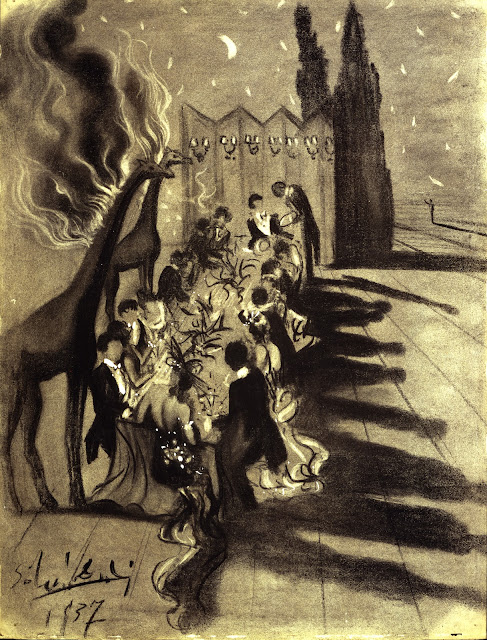Where Ideas Come From: Dalí’s Drawings
The Dalí Museum will present more than 100 works on paper from the Museum’s vault in Where Ideas Come From: Dalí’s Drawings from May 27-Oct. 22. Showcasing the artist’s utilization of various media, including pencil, pen, charcoal, watercolor and gouache, Dalí’s Drawings will highlight Dalí’s creative process throughout the many phases of his career.
More than half of the artworks will be on view for the first time in 35 years and will rarely be displayed again due to their fragile nature. Through the support of donations from the community, the majority of the works featured in the exhibition were recently conserved — for the first time — in alignment with The Dalí’s mission to care for and share Dalí’s work and legacy.
“Drawing is perhaps the most direct way to bring what is in the mind through the hand and into the world — a critical part of the creative process and one that Dalí was committed to throughout his life,” said Hank Hine, the Museum’s executive director. “We look forward to sharing with visitors the insights these works provide into his practice and imagination.”
Organized chronologically from 1916 to 1974, the works are delineated into four distinct periods of the artist’s life: Early Period; Surrealism; Nuclear Mysticism, Classicism and Religion; and Late Period. The thematic groupings will feature studies for major oil paintings, portraits, experimental drawing techniques and commercial projects, including film.
Works from Dalí’s Early Period, including student sketches, book illustrations, poster designs and provocative self-portraits, demonstrate his natural mastery of drawing and painting techniques. These works trace the artist’s transition from Classicism to Cubism, and ultimately anti-art.
The Surrealism section will highlight illuminating studies for such works as The Weaning of Furniture Nutrition (1934) and Old Age, Adolescence, Infancy (The Three Ages) (1940); illustrations for Le Chants de Maldoror (1940); and examples of Dalí’s experimentation with various surrealist drawing techniques. This section also includes two of The Dalí’s new acquisitions: Drawing for 'Bacchanale,' Ludwig II of Bavaria (1939), a ballet-inspired portrait of King Ludwig II of Bavaria, and Untitled (Paranoiac Face) (c. 1935), a frontispiece — the illustration facing the title page of a book — dedicated to Paul Éluard from Dalí’s book Conquest of the Irrational.
Some of Dalí’s most recognizable work will be on view in the section focused on his Nuclear Mysticism, Classicism and Religion period. Illustrations for works by the Italian poet, writer and philosopher Dante Alighieri and the ballet Tres Picos will appear alongside familiar motifs of exploding watches, flies, disintegrating figures and religious-tinged images of dissolving angels. Transformations and studies for The Sacrament of the Last Supper (1955) and Christ of St. John of the Cross (1951) will round out this section.
The final section, Late Period, will include diverse selections with small studies of The Hallucinogenic Toreador (1969-1970) and Galacidalacidesoxiribunucleicacid (Homage to Crick and Watson) (1962-1963). Dalí’s Drawings will conclude with the 1974 Iceberg Sketch, a self-portrait Dalí gifted to the founders of The Dalí Museum, A. Reynolds and Eleanor Morse.
Where Ideas Come From: Dalí’s Drawings is curated by Peter Tush, The Dalí’s curator of education. A catalog featuring all 166 works on paper in The Dalí’s permanent collection will accompany the exhibition and serve as a companion to The Dalí Museum’s oil paintings catalog published in 2021.
About The Dalí Museum
The Dalí Museum, located in picturesque downtown St. Petersburg, Fla., is home to one of the most acclaimed collections of a single modern artist in the world, with over 2,000 works representing every moment and medium of Salvador Dalí’s creative life. The Dalí is recognized internationally by the Michelin Guide with a three-star rating; has been deemed “one of the top buildings to see in your lifetime” by AOL Travel News; and was named one of the 10 most interesting museums in the world by Architectural Digest. The Dalí’s acclaimed digital experiences have received numerous national and international awards for creative innovation. The Museum is a not-for-profit organization whose mission is to preserve Dalí’s legacy for generations to come and serve as an active resource in the cultural life of the community and the world at large. The Dalí is open daily, located at One Dalí Boulevard, St. Petersburg, Fla. 33701. For more information, visit TheDali.org or download the free Dalí Museum App.

Salvador Dalí Dîner dans le désert éclairé par les girafes en feu( Dinner in theDesert Lit by Burning Giraffes)1937Charcoal and gouache on paper24 ¼ in x 18 in Collection of The Dalí Museum, St. Petersburg, FL (USA)In the USA: © Salvador Dalí Museum, Inc., St. Petersburg, FL, 2022 / Worldwide :©Salvador Dalí, Fundació Gala-Salvador Dalí, (ARS), 2022
Salvador Dalí, Study for “Disappearing Images”,1939 Charcoal on paper19 in x 24 ¾ inCollection of The Dalí Museum, St. Petersburg, FL (USA)In the USA: © Salvador Dalí Museum, Inc., St. Petersburg, FL, 2022 / Worldwide :©Salvador Dalí, Fundació Gala-Salvador Dalí, (ARS), 2022
Salvador Dalí, Study for Soft Watch Exploding, 1954
Ink and pencil on paper
5 in x 6 ¾ in
Collection of The Dalí Museum, St. Petersburg, FL (USA)
In the USA: © Salvador Dalí Museum, Inc., St. Petersburg, FL, 2022 / Worldwide : ©Salvador Dalí, Fundació Gala-Salvador Dalí, (ARS), 2022

Salvador Dalí, Drawing for "Bacchanale". Ludwig II of Bavaria, 1939
Ink, watercolor, gouache and collage on paper
8 in x 12.5 in
Collection of The Dalí Museum, St. Petersburg, FL (USA)
In the USA: © Salvador Dalí Museum, Inc., St. Petersburg, FL, 2022 / Worldwide : ©Salvador Dalí, Fundació Gala-Salvador Dalí, (ARS), 2022
Salvador Dalí, Les Fourmis (Ants), c. 1936
Gouache on tinted paper
25 ¾ in x 19 ½ in
Collection of The Dalí Museum, St. Petersburg, FL (USA)
In the USA: © Salvador Dalí Museum, Inc., St. Petersburg, FL, 2022 / Worldwide : ©Salvador Dalí, Fundació Gala-Salvador Dalí, (ARS), 2022



Comments
Post a Comment